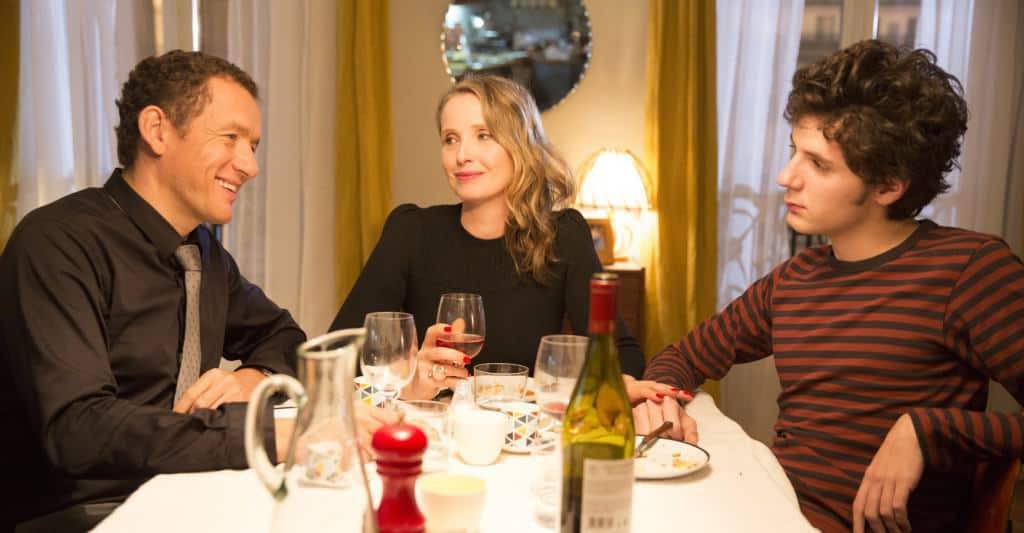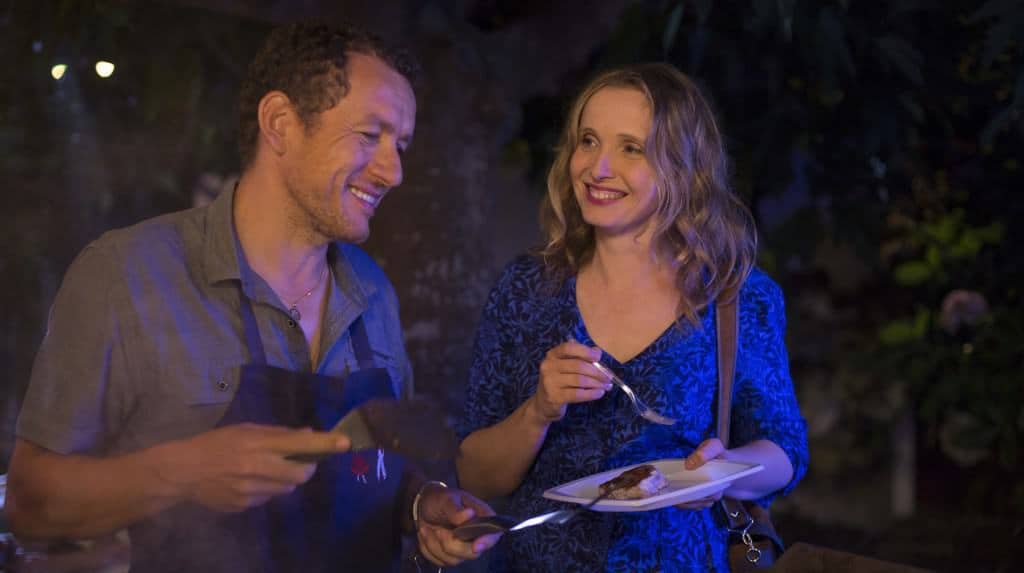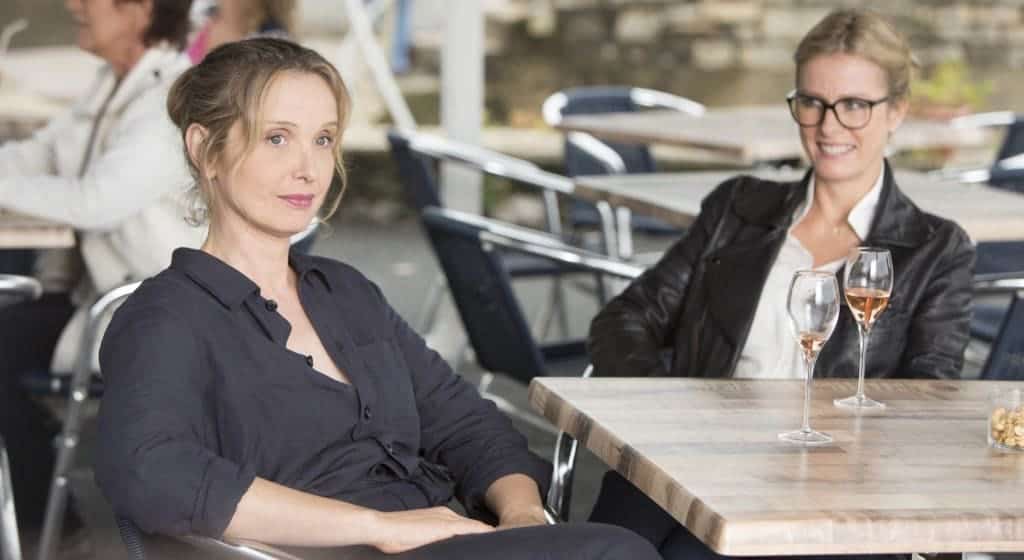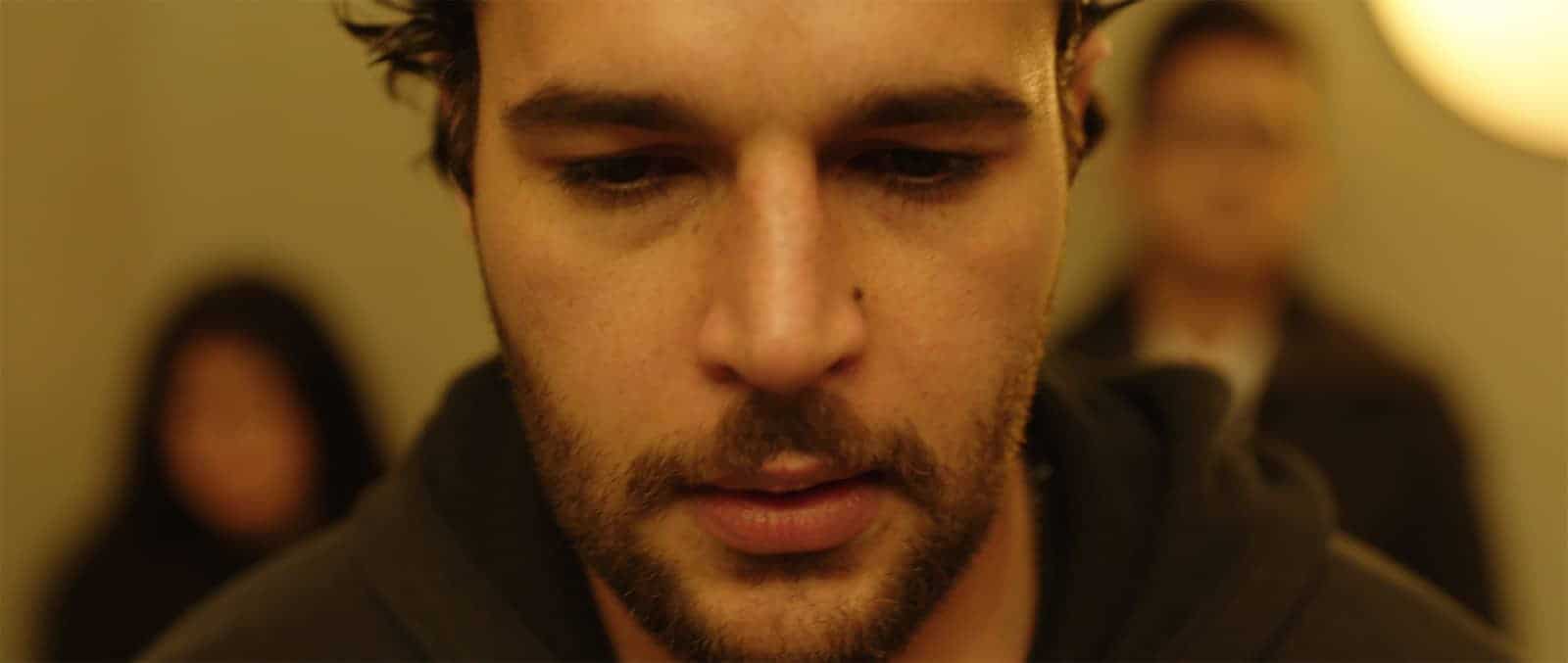Writer-Director-Actress Julie Delpy discusses her consummately entertaining new movie, Lolo, which is chock full of the same joie de vivre Delpy channels in real life. Read more interviews with female directors here.

Julie Delpy — who enthralled audiences in Richard Linklater’s Before movies — is also an impressive director in her own right. She wrote, directed, and starred in her newest movie, Lolo, which just premiered at Lincoln Center’s Rendez-Vous with French Cinema. The film is her most farcical comedy to date.
Like 2 Days in Paris (2007) and 2 Days in New York (2012), Lolo is about a romance between people from different worlds. Delpy plays Violette, a sophisticated Parisian fashionista who falls for sweet country bumpkin Jean René (Dany Boon). But the couple’s relationship is threatened less by cultural differences than by a third party. Lolo (Vincent Lacoste), Violette’s 19-year-old son, is the Oedipus complex incarnate. He’ll stop at nothing to break them up.
Lolo is consummately entertaining — chock full of the same joie de vivre Delpy channels in real life. I sat down with her to discuss the movie’s comedic sensibility and production design.
Seventh Row (7R): Lolo feels like a comedy even though it takes a dark turn. How did you manage to keep it funny?
Julie Delpy (JD): I tried to keep a certain realism, always on the borderline with farce. I like going far but not too far…[and then] there are moments when it’s okay to go too far. I just have fun and avoid things that are expected. For example, when Lolo plants the virus in Jean René’s computer, a lot of people said, “Oh, it’s going to be porn.” I don’t know why people always think that. I’m like, “No, no, no, it’s going to be a funny, little Pac-Man political moment because porn would be too obvious.” The film talks about sex; [we didn’t] need to add a porn scene. Why do that? Then it becomes heavy.
It’s fun to show women talk about sex and be disrespectful to the sacred act of sex and love and not care so much about it, but at the same time don’t go too far and fall into the obvious trap. I might have fallen into a few traps in this film, but I think I avoided the main ones.
7R: Violette’s apartment looks really lived in, and the countryside scenes contrast with those set in Paris. How did you come up with the film’s visual concept?
JD: I know smaller towns in France. I know people like Jean-René. Part of my family lives in Brittany. They’re really wonderful people but very provincial, and I’m a Parisian, born and raised in Paris.
I wanted [the apartment] to be “bobo,” which means “bohemian bourgeois.” It’s actually a set. I had it built because I knew the choreography of how the scenes would play out. Everything is kind of mapped out based on the screenplay. One bedroom is at the end, Lolo’s bedroom is at the other end, and the toilet is next to Lolo’s bedroom. There’s the big living room in the middle. It had to be that way for all sorts of comedic reasons. And then I wanted the look of the apartment to be very specific: colourful, kind of pretty, very cool, mid-century bohemian — bohemian but with a little bit of money
7R: The colours in the movie are really fun.
JD: Yeah, even though it’s a dark comedy, I wanted the visuals to be very easy to take in.

7R: Violette is very stylish in how she dresses. How did you develop her costumes, given that she works in the fashion world?
JD: I know people in the fashion world. They can be fashion-y but they always have some originality or a unique taste. They don’t go for head-to-toe Prada. Some people do, but the more bohemian, artsy people go for cool stuff—vintage Saint Laurent mixed with a pair of Prada shoes. They mix things. They don’t just go for one style—that’s too obvious. So I had my costume designer look for vintage Saint Laurent. I also wear a Chanel and a Leonard Paris, which is one of my favourite designers from the 1970s and ‘80s.
7R: You wrote, directed, and starred in Lolo, as well as the 2 Days movies. What do you see as the advantages and disadvantages of occupying these roles simultaneously?
JD: I always say my main thing when I do both — no matter if I’m in a scene or not — is I prepare everything really well. I make sure I don’t find myself caught in a situation where I don’t know my lines perfectly. I never leave anything to chance because that’s a recipe for disaster. I know exactly how and where I’m going to shoot everything. Sometimes, I change my mind — and thank God, because everyone should — but most of the time, I know what I want.
One of the advantages of directing and acting at the same time is the power I have to change the tone of the scene. Sometimes, you can influence the acting of [other] actors by your own acting. I like the idea of making comedies but keeping a certain naturalism in the acting so that it doesn’t sound fake.
But sometimes it’s hard to get the distance on your own performance. It’s not easy. I’m pretty able to judge other actors’ performances when I’m in the scene with them, but it’s harder for me to judge myself. So I sometimes do two or three takes.

7R: The bulk of the movie’s plot focuses on Violette, Jean René, and Lolo. But the film opens with a conversation between Ariane and Violette. Why did you chose to start there?
JD: I wanted to set up who [Violette] is. She is a bit of a snobbish Parisian, but she is a more neurotic than her friend — so she is more vulnerable. Ariane is much less vulnerable: she has a daughter, but she doesn’t care about her. She and Violette are opposites, but they’re best friends.
I wanted to set up a certain tone that they’re women in their 40s having a good time. They’re silly as hell. They’ve gotten past taking themselves seriously. Ariane [Karin Viard] is a fantastic actress, and I wrote all those lines for her because I thought it would be funny that she doesn’t give a shit about anything. She pees in the pool. I have friends not far from that. They’re badass. [It’s] so freeing. Writing it was freeing, too.

